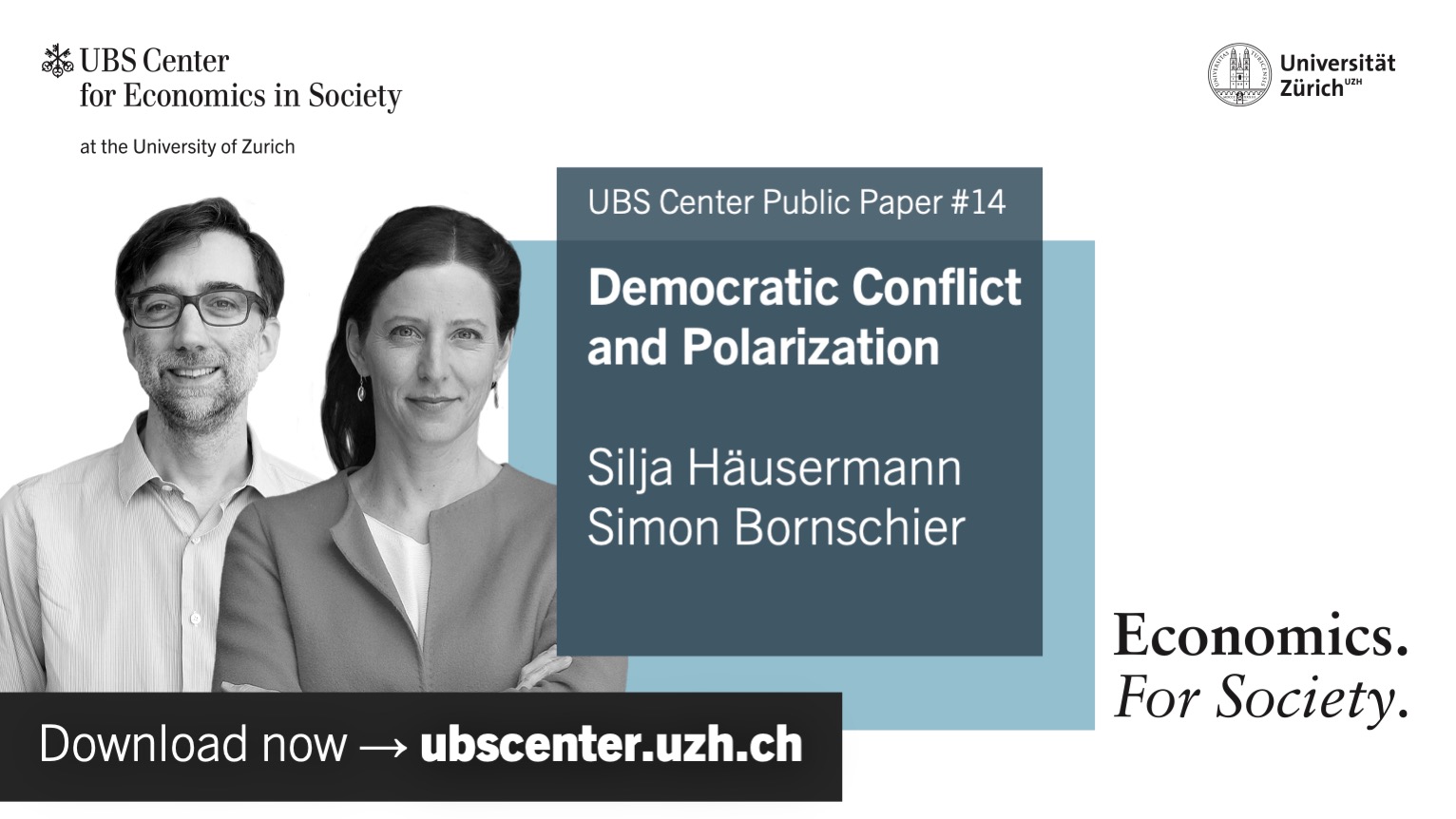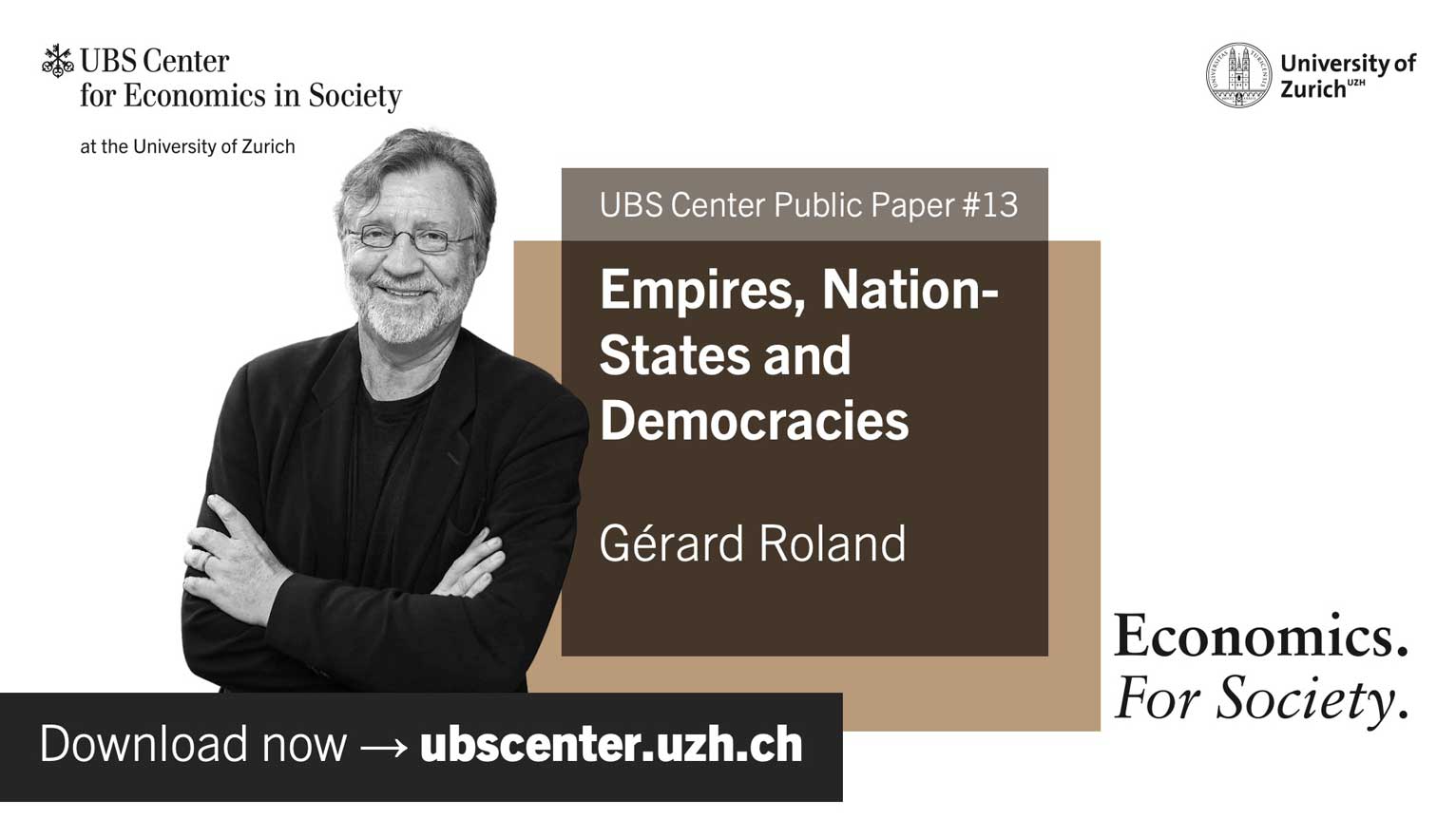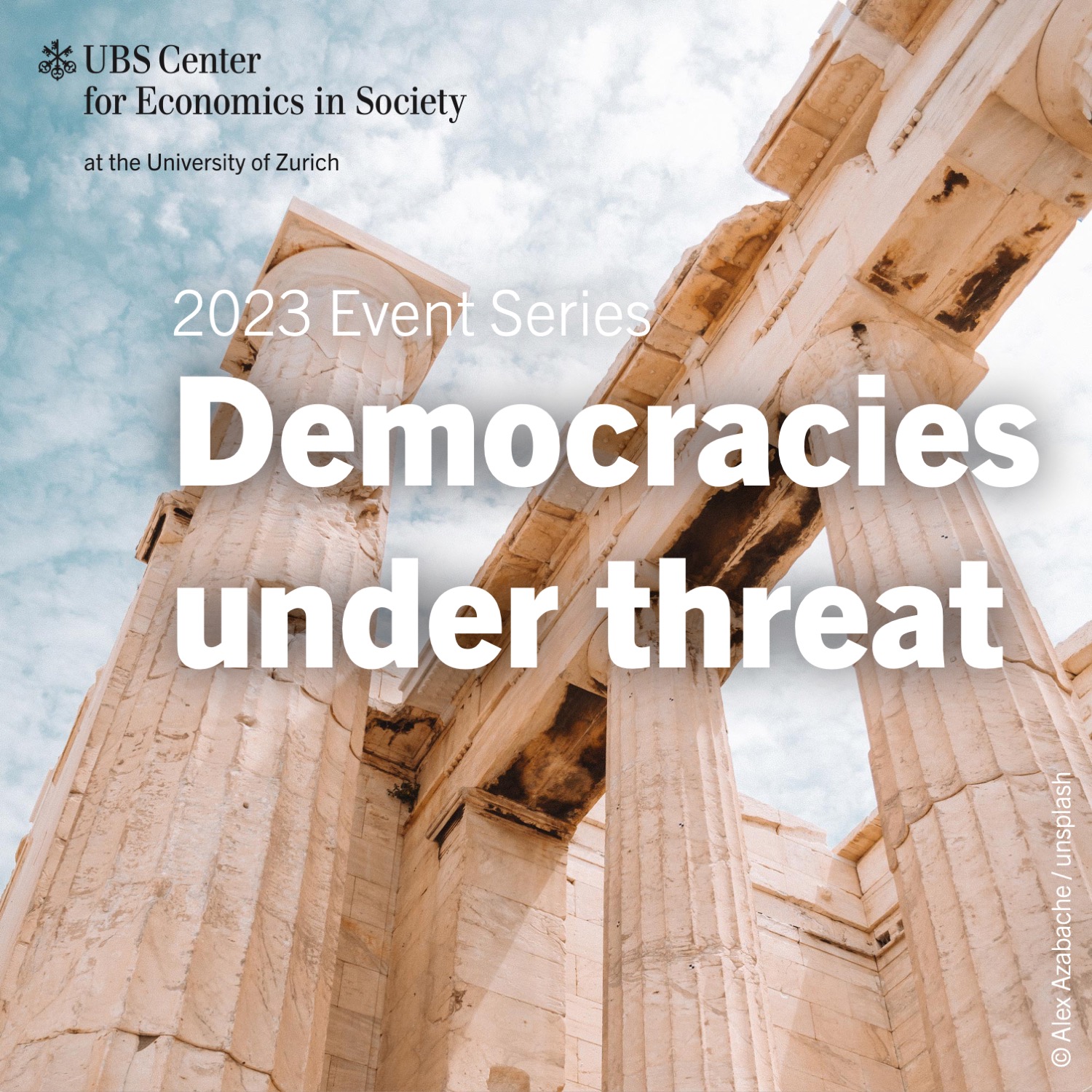Livestreams
Press
'The immune system of our democracy is broken' Handelszeitung Interview with Hélène Landemore on 26.12.2023 read
«Das Immunsystem unserer Demokratie ist kaputt» Handelszeitung Interview mit Hélène Landemore am 26.12.2023 lesen
«Der zweite Versuch der Machtergreifung ist gefährlicher» Republik Interview mit Daniel Ziblatt vom 30.11.2023 lesen
'Democracy dies in a fire' Watson interview with Jason Brennan on 19.11.2023 read
'Hitler managed to take power thanks to mainstream politicians. We must remember this.' NZZ am Sonntag interview with Daniel Ziblatt on 2.12.2023 read
'Macron believes the population is too immature to decide on issues such as immigration' NZZ Interview with Hélène Landemore on 14.11.2023 read
«Hitler schaffte die Machtübernahme dank Mainstream-Politikern. Daran müssen wir uns erinnern» NZZ am Sonntag Interview mit Daniel Ziblatt vom 2.12.2023 lesen
Ausweg aus Krisen SRF News Bericht vom 22.11.2023 schauen
Die Freiheit könnte uns gestohlen werden Republik Aufsatz von Herta Müller vom 20.11.2023 lesen
«Die Demokratie stirbt in einem Feuer» Watson Interview mit Jason Brennan vom 19.11.2023 lesen
''Progressives hate progress'' Schweizer Monat Studio interview with Steven Pinker on 17.11.2023 watch
'The future is in our hands' UZH News Article from 26.10.2023 read
«Macron hält die Bevölkerung für zu unreif, um über Themen wie die Immigration zu entscheiden» NZZ Interview mit Hélène Landemore vom 14.11.2023 lesen
'Actually, we always live in hard and difficult times' NZZaS interview with Steven Pinker on 28.10.2023 read
«Eigentlich leben wir immer in harten und schwierigen Zeiten» NZZaS Interview mit Steven Pinker vom 28.10.2023 lesen
«Die Zukunft liegt in unseren Händen» UZH News Bericht vom 26.10.2023 lesen
Deutschland ist auf dem Weg zum «kranken Mann» nicht nur in Europa, sondern in der Welt zu werden Schweizer Monat Artikel vom 25.10.2023 lesen
Rede zur Zukunft der freiheitlichen Demokratie von Wolfgang Schäuble am 24.10.2023 lesen
Sind die Amerikaner zu dumm für die Demokratie? Watson Artikel vom 24.9.2023 lesen
«Putin wird – um es sarkastisch zu sagen – Europa helfen, zu sich selber zu finden» Tages-Anzeiger Interview mit Wolfgang Schäuble vom 16.10.2023 lesen
'Putin will – to put it sarcastically – help Europe to find itself' Tages-Anzeiger interview with Wolfang Schäuble on 16.10.2023 read
Democratic conflict and polarization
Several developments in Western democracies over the past decade have sparked worries about political stability. Standing out are the rise of radical political parties, heated polarization around questions of immigration, nationalism, or social liberalism, and – in some cases – attacks on democratic institutions. However, conflict and choice between clearly distinctive alternative ideas of how societies and economies should be governed are at the heart of democracy. Democracy needs competition and conflict. But where is the line between healthy and harmful conflict and polarization? Silja Häusermann and Simon Bornschier address this question in our new Public Paper.
Several developments in Western democracies over the past decade have sparked worries about political stability. Standing out are the rise of radical political parties, heated polarization around questions of immigration, nationalism, or social liberalism, and – in some cases – attacks on democratic institutions. However, conflict and choice between clearly distinctive alternative ideas of how societies and economies should be governed are at the heart of democracy. Democracy needs competition and conflict. But where is the line between healthy and harmful conflict and polarization? Silja Häusermann and Simon Bornschier address this question in our new Public Paper.

Progressives hate progress
Empires, nation-states and democracies
The coexistence of democracies, empires, and nation-states regularly leads to conflict. What role do forms of government play in the development of international relations? In particular, how can we protect small or vulnerable democracies in order to stop the current decline of democracies? As an introductory reading for our event series, we recommend the UBS Center Public Paper by Gérard Roland, which provides information on these very issues.
The coexistence of democracies, empires, and nation-states regularly leads to conflict. What role do forms of government play in the development of international relations? In particular, how can we protect small or vulnerable democracies in order to stop the current decline of democracies? As an introductory reading for our event series, we recommend the UBS Center Public Paper by Gérard Roland, which provides information on these very issues.

Overview
Democracies around the globe are increasingly under threat. In many countries, populists are gaining ground, polarization is increasing, and voters often fail to vote. Public intellectuals are debating the prospects for post-democratic politics. At the same time, authoritarian regimes are seeing a resurgence. What is driving these trends? And what can be done to reverse them? This was the main topic of our series, which consisted of three events, beginning with a lecture by Wolfgang Schäuble (in German), who provided a political-historical framework of the topic, followed by a talk by experimental psychologist Steven Pinker, who discussed the role of rationality for democratic societies. We concluded with our annual Forum for Economic Dialogue, where experts from various fields discussed the topic from both a political and an economic perspective.
Democracies around the globe are increasingly under threat. In many countries, populists are gaining ground, polarization is increasing, and voters often fail to vote. Public intellectuals are debating the prospects for post-democratic politics. At the same time, authoritarian regimes are seeing a resurgence. What is driving these trends? And what can be done to reverse them? This was the main topic of our series, which consisted of three events, beginning with a lecture by Wolfgang Schäuble (in German), who provided a political-historical framework of the topic, followed by a talk by experimental psychologist Steven Pinker, who discussed the role of rationality for democratic societies. We concluded with our annual Forum for Economic Dialogue, where experts from various fields discussed the topic from both a political and an economic perspective.

Speakers
Wolfgang Schäuble studied law and economics and was awarded the degree of Dr. jur. in 1971. Dr Schäuble has been a member of the German Bundestag since 1972 and served as the Parliamentary Secretary of the CDU/CSU Parliamentary Group from 1981 to 1984. He then held the offices of Federal Minister for Special Tasks and Head of the Federal Chancellery, before serving as Federal Minister of the Interior from 1989 to 1991. Dr Schäuble has been a member of the CDU National Executive Committee since 1989 until 2021. He headed the CDU/CSU Parliamentary Group in the German Bundestag from 1991 until 2000;from 1998 until 2000 he was also the national chairman of the CDU. He has been a member of the CDU Presidium since that time until 2021. He was the Deputy Head of the CDU/CSU Parliamentary Group in the German Bundestag for Foreign, Security and European Policy from 2002 until he was again appointed Federal Minister of the Interior in 2005. From 2009 to 2017 he was Federal Minister of Finance and then President of the German Bundestag until 2021.
Steven Pinker is a Johnstone Family Professor at the Department of Psychology at Harvard University. He conducts research on language and cognition and writes for publications such as the New York Times, Time, and The Atlantic. He is the author of ten books, including The Language Instinct, How the Mind Works, The Blank Slate, The Stuff of Thought, The Better Angels of Our Nature, The Sense of Style, and most recently, Enlightenment Now - The Case for Reason, Science, Humanism, and Progress. He is a two-time Pulitzer Prize finalist, a Humanist of the Year, a recipient of nine honorary doctorates, and one of Foreign Policy’s “World’s Top 100 Public Intellectuals” and Time’s “100 Most Influential People in the World Today”.
Herta Müller was born in Romania in 1953, studied Romanian and German literature in Timisoara, and later worked as a translator in a machine factory. Because she refused to spy on her colleagues for the Romanian secret service (Securitate), she lost her job and became a target of the Securitate herself. In 1987, Herta Müller came to Germany, where she was unable to shake off Romania’s communist regime and the persecuting terror of the Securitate for a long time. They were still on her heels in West Germany. The persistent presence of persecution by the regime is reflected in her numerous award-winning publications. In 2009, she received the Nobel Prize in Literature. Her work has been translated into over 50 languages.
Daniel Ziblatt is Eaton Professor of the Science of Government at Harvard University and director of the “Transformations of Democracy” group at the WZB Berlin Social Science Center. He specializes in the study of Europe and the history of democracy. His three books include How Democracies Die, co-authored with Steve Levitsky, a New York Times best-seller, translated into thirty languages. He is also the author of Conservative Parties and the Birth of Democracy, an account of Europe’s historical democratization, which won several prizes including the American Sociological Association’s Barrington Moore Prize and the American Political Science Association’s 2018 Woodrow Wilson Prize for the best book in government and international relations. His first book was an analysis of 19th century state building, Structuring the State – The Formation of Italy and Germany and the Puzzle of Federalism. Ziblatt has been a visiting scholar at Ludwig-Maximilian University (Munich), Sciences Po (Paris), the European University Institute (Italy), the Max Planck Institute (Cologne), Stanford’s Center for Advanced Study in the Behavioral Sciences, Harvard’s Radcliffe Institute for Advanced Study, and was the 2019 recipient of the Berlin Prize from the American Academy in Berlin.
Hélène Landemore is a professor of political theory at Yale University and a Distinguished Researcher at the Oxford University Institute for Ethics in AI. At Yale she is also a leader of the Institution for Social and Policy Studies (ISPS)'s Democratic Innovations program. She is the author of Democratic Reason (Princeton University Press 2013, Spitz Prize 2015), Open Democracy (Princeton University Press 2020), and Debating Democracy (Oxford University Press 2021, with Jason Brennan) as well as various edited volumes and articles in democratic theory. She has served as governance board member of the French Citizens' Convention on end-of-life issues from October 2022 to April 2023 and is a strategic advisor to the non-profit organization DemocracyNext.
Jason Brennan is Robert J. and Elizabeth Flanagan Family Professor of Strategy, Economics, Ethics, and Public Policy at the McDonough School of Business at Georgetown University. He specializes in politics, philosophy, and economics. He is the editor of Public Affairs Quarterly and an associate editor of Social Philosophy and Policy. He is currently overseeing a $2.1 million project on “Markets, Social Entrepreneurship, and Effective Altruism”, funded by the Templeton Foundation. He serves on the Virginia Advisory Committee to the US Commission on Civil Rights, chairs the Designing the Future(s) Committee at Georgetown, and serves on the Georgetown Faculty Senate. He is the author of 16 books and he has published over 50 articles in peer-reviewed journals and over 30 peer-reviewed chapters in edited anthologies. In 2022, Brennan received the Provost’s Innovation in Teaching Award for his development of the Ethics Project, a student-directed experiential learning project.
Silja Häusermann is a Professor of Political Science at the University of Zurich in Switzerland, where she teaches classes on Swiss politics, comparative political economy, comparative politics and welfare state research. Her research interests are in comparative politics and comparative political economy.
Joachim Voth received his PhD from Oxford in 1996. He works on financial crises, long-run growth, as well as on the origins of political extremism. He has examined public debt dynamics and bank lending to the first serial defaulter in history, analysed risk-taking behaviour by lenders as a result of personal shocks, and the investor performance during speculative bubbles. Joachim has also examined the deep historical roots of anti-Semitism, showing that the same cities where pogroms occurred in the Middle Age also persecuted Jews more in the 1930s; he has analyzed the extent to which schooling can create radical racial stereotypes over the long run, and how dense social networks (“social capital”) facilitated the spread of the Nazi party. In his work on long-run growth, he has investigated the effects of fertility restriction, the role of warfare, and the importance of state capacity. Joachim has published more than 80 academic articles and 3 academic books, 5 trade books and more than 50 newspaper columns, op-eds and book reviews. His research has been highlighted in The Economist, the Financial Times, the Wall Street Journal, the Guardian, El Pais, Vanguardia, La Repubblica, the Frankfurter Allgemeine, NZZ, der Standard, der Spiegel, CNN, RTN, Swiss and German TV and radio.
Natasha Wunsch is Professor of European Studies at the University of Fribourg. She was previously Assistant Professor at Sciences Po and Senior Researcher at ETH Zurich. Her research studies the interaction between processes of democratisation and democratic backsliding and EU-level cooperation, with a particular focus on the post-communist region. Wunsch holds a PhD from University College London and completed her habilitation at ETH Zurich.
David Yanagizawa-Drott received his PhD from IIES at Stockholm University in 2010. At that point, he was hired as Assistant Professor at John F. Kennedy School of Government, Harvard University. He was then promoted to Associate Professor in 2014. In 2016, he was hired as a full professor at University of Zürich. His research has shown that propaganda can cause violent conflict, studying the impact of hate media during the Rwanda Genocide. David has also examined the role of political protests in shaping policy outcomes and elections, establishing evidence that they can be highly effective in moving public opinion. In developing countries, a lot of his work focuses on the how to improve health outcomes and economic outcomes for poor households. In this line of work, for example, David implemented a randomized field experiment that showed that a simple Community Health Worker intervention in Uganda, based on a social entrepreneurship model, reduced child mortality by more than twenty percent. David is a member of several research networks, such as Poverty Action Lab (J-PAL), The Bureau for Research and Economic Analysis of Development (BREAD), European Development Research Network (EUDN) and Center for Economic Policy Research (CEPR). His work has been highlighted in various international media outlets, such as the New York Times, Washington Post, The Guardian, The Economist and various national TV news broadcasts in the U.S.
Wolfgang Schäuble studied law and economics and was awarded the degree of Dr. jur. in 1971. Dr Schäuble has been a member of the German Bundestag since 1972 and served as the Parliamentary Secretary of the CDU/CSU Parliamentary Group from 1981 to 1984. He then held the offices of Federal Minister for Special Tasks and Head of the Federal Chancellery, before serving as Federal Minister of the Interior from 1989 to 1991. Dr Schäuble has been a member of the CDU National Executive Committee since 1989 until 2021. He headed the CDU/CSU Parliamentary Group in the German Bundestag from 1991 until 2000;from 1998 until 2000 he was also the national chairman of the CDU. He has been a member of the CDU Presidium since that time until 2021. He was the Deputy Head of the CDU/CSU Parliamentary Group in the German Bundestag for Foreign, Security and European Policy from 2002 until he was again appointed Federal Minister of the Interior in 2005. From 2009 to 2017 he was Federal Minister of Finance and then President of the German Bundestag until 2021.
Steven Pinker is a Johnstone Family Professor at the Department of Psychology at Harvard University. He conducts research on language and cognition and writes for publications such as the New York Times, Time, and The Atlantic. He is the author of ten books, including The Language Instinct, How the Mind Works, The Blank Slate, The Stuff of Thought, The Better Angels of Our Nature, The Sense of Style, and most recently, Enlightenment Now - The Case for Reason, Science, Humanism, and Progress. He is a two-time Pulitzer Prize finalist, a Humanist of the Year, a recipient of nine honorary doctorates, and one of Foreign Policy’s “World’s Top 100 Public Intellectuals” and Time’s “100 Most Influential People in the World Today”.
Herta Müller was born in Romania in 1953, studied Romanian and German literature in Timisoara, and later worked as a translator in a machine factory. Because she refused to spy on her colleagues for the Romanian secret service (Securitate), she lost her job and became a target of the Securitate herself. In 1987, Herta Müller came to Germany, where she was unable to shake off Romania’s communist regime and the persecuting terror of the Securitate for a long time. They were still on her heels in West Germany. The persistent presence of persecution by the regime is reflected in her numerous award-winning publications. In 2009, she received the Nobel Prize in Literature. Her work has been translated into over 50 languages.
Daniel Ziblatt is Eaton Professor of the Science of Government at Harvard University and director of the “Transformations of Democracy” group at the WZB Berlin Social Science Center. He specializes in the study of Europe and the history of democracy. His three books include How Democracies Die, co-authored with Steve Levitsky, a New York Times best-seller, translated into thirty languages. He is also the author of Conservative Parties and the Birth of Democracy, an account of Europe’s historical democratization, which won several prizes including the American Sociological Association’s Barrington Moore Prize and the American Political Science Association’s 2018 Woodrow Wilson Prize for the best book in government and international relations. His first book was an analysis of 19th century state building, Structuring the State – The Formation of Italy and Germany and the Puzzle of Federalism. Ziblatt has been a visiting scholar at Ludwig-Maximilian University (Munich), Sciences Po (Paris), the European University Institute (Italy), the Max Planck Institute (Cologne), Stanford’s Center for Advanced Study in the Behavioral Sciences, Harvard’s Radcliffe Institute for Advanced Study, and was the 2019 recipient of the Berlin Prize from the American Academy in Berlin.
Program
|
October 24, 2023 |
Opinions Die Zukunft der freiheitlichen Demokratie (in German) Wolfgang Schäuble (CDU) Venue: University of Zurich |
|
November 7, 2023 |
Opinions Rationality: What it is, why it seems scarce, why it matters Steven Pinker (Harvard University) Venue: University of Zurich |
|
November 13, 2023 |
Forum for Economic Dialogue Demokratien in Gefahr (Keynote in German) Nobel laureate Herta Müller *** How democracies die – and what can be done to save them (Zurich Lecture for Economics in Society) Daniel Ziblatt (Harvard University) *** Debating democracy (Disputation) Hélène Landemore (Yale University) & Jason Brennan (Georgetown University) *** Research Slam Silja Häusermann (UZH), Joachim Voth (UZH), Natasha Wunsch (UNIFR), David Yanagizawa-Drott (UZH) Venue: Kongresshaus Zurich |
|
October 24, 2023 |
Opinions Die Zukunft der freiheitlichen Demokratie (in German) Wolfgang Schäuble (CDU) Venue: University of Zurich |
|
November 7, 2023 |
Opinions Rationality: What it is, why it seems scarce, why it matters Steven Pinker (Harvard University) Venue: University of Zurich |
|
November 13, 2023 |
Forum for Economic Dialogue Demokratien in Gefahr (Keynote in German) Nobel laureate Herta Müller *** How democracies die – and what can be done to save them (Zurich Lecture for Economics in Society) Daniel Ziblatt (Harvard University) *** Debating democracy (Disputation) Hélène Landemore (Yale University) & Jason Brennan (Georgetown University) *** Research Slam Silja Häusermann (UZH), Joachim Voth (UZH), Natasha Wunsch (UNIFR), David Yanagizawa-Drott (UZH) Venue: Kongresshaus Zurich |
